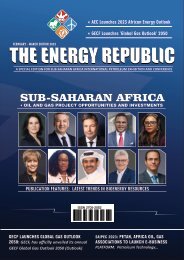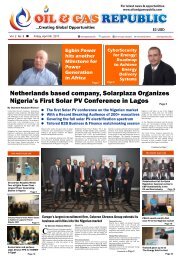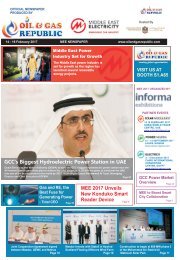The Energy Republic July Edition 2022
This magazine is a Special Edition focused on the NOG Conference and Exhibition 2022. The Nigeria oil and gas industry is undergoing a transformation following the recent policy enactment such as the Petroleum Industry Act (PIA) and ‘Decade of Gas Initiatives’ led by the Federal Government of Nigeria. This years’ NOG Conference features world-class conference programmes, including panel sessions to enable industry stakeholders, players and government discuss strategies in funding Nigerian energy mix going forward. In this edition, we featured an exclusive interview with H.E Chief Timipre Slyva, Honourable Minister of State for Petroleum Resources, including stakeholders and experts commentaries which are aligned based on the global trends in the energy, oil and gas industry. For general inquiries, please email us at: info@theenergyrepublic.com
This magazine is a Special Edition focused on the NOG Conference and Exhibition 2022. The Nigeria oil and gas industry is undergoing a transformation following the recent policy enactment such as the Petroleum Industry Act (PIA) and ‘Decade of Gas Initiatives’ led by the Federal Government of Nigeria. This years’ NOG Conference features world-class conference programmes, including panel sessions to enable industry stakeholders, players and government discuss strategies in funding Nigerian energy mix going forward.
In this edition, we featured an exclusive interview with H.E Chief Timipre Slyva, Honourable Minister of State for Petroleum Resources, including stakeholders and experts commentaries which are aligned based on the global trends in the energy, oil and gas industry.
For general inquiries, please email us at: info@theenergyrepublic.com
Create successful ePaper yourself
Turn your PDF publications into a flip-book with our unique Google optimized e-Paper software.
MINISTER INTERVIEW
need to connect. We are doing a
feasibility study at the moment.
Regarding funding, we have been
meeting with a lot of European firms
and countries and we will get funding
for the project from Europe. We had a
meeting with Algeria and Niger in Abuja
to discuss gas supply and with the
demand for gas increasing and the
energy transition intensifying, we are
eager to develop to meet our timeline.
AEC: Where do you see the most
capital constraints considering this has
been a pressing issue across the globe
due to tightening of financing as a
result of the energy transition?
Sylva: Capital is our main constrain in
Nigeria’s oil and gas sector. We have
problems with investment from
everywhere because the world is
moving fast to renewables. But now,
everyone is coming to terms with the
fact that we need to stick with fossil
fuels. Europe for instance, is
considering gas as clean energy along
with nuclear. As a result, the funding
constraints will ease in due course.
Africa is not ready to move away from
oil and gas because we have a huge
amount of people without access to
energy and hydrocarbons will enable us
to meet SDG 7 goals of providing access
to reliable energy. We have decided
that Africa-based financial institutions
such as the African Energy Bank which
the African Petroleum Producers
Association is working towards will be
the ones to fund African energy
developments. International oil
companies are increasing their interest
in offshore investment because fiscal
terms are attractive. If we keep fiscal
terms attractive, we will get more
funding from international parties.
AEC: What is the status of Bonga
South West projects? Has there be any
movement?
Sylva: There is a little bit of slow down.
Shell thinks that it is easier to develop
the north than south. The energy major
wants to focus on Bonga north first and
we have been having increased
discussions with them on that as well as
on gas.
AEC: What is the role of deepwater gas
in Nigeria? Are there any incentives for
firms wanting to produce?
Equinor discussed this and wanted the
terms stated in the PIA. We will address this
on a case-by-case basis, and we are happy to
give favorable terms to them and other
firms willing. We did this with Shell and
worked with them on good terms.
AEC: The demand for hydrocarbons
continues to increase and there is focus to
increase energy access using gas in Africa.
What are your plans to use gas to do that?
Sylva: Africa will need to utilize
hydrocarbons to generate power. Gas is our
choice to produce and increase electricity
access. One of the projects we are deploying
in Nigeria is a major gas turbine in Abuja,
which was previously unthinkable because
there was no gas supply. In the north, we
have a firm seeking to invest in an energy
island. The project will transport gas
virtually from the south via the
Ajaokuta–Kaduna–Kano (AKK) Natural Gas
Pipeline.
A lot of industries which had shutdown are
now coming back into operation owing to
access to gas from the AKK and with gas we
will be able to resolve our energy problems.
We are trying to build more gas turbines, gas
grids and pipelines from Nigeria south to
Lagos and we are taking these pipelines
outside Nigeria.
For instance, between Nigeria and Togo, we
have a pipeline which we will extend to
Morocco to support electricity production.
nvestors who are willing to bring back
projects such as the Lokola liquefied natural
igas project online.
AEC: Nigeria is one of the OPEC members
participating at African Energy Week in
October. What message will you share
with stakeholders and what deals would
you like to see being signed?
Sylva: It is too early to say we have deals
but a lot of deals are at the table. We will
bring back the Trans Sahara Gas Pipeline
discussion and deal. We have also identified
20 critical gas projects in Nigeria which we
will discuss or sign.
We are focusing on gas going forward on
the back of the Decade of Gas initiative and
now we have clear gas fiscal provisions in
the PIA. The government is encouraging
investments and we are working with
investors to bring these gas projects online.
We cannot move quickly to renewables: we
are not ready, and we are happy that the
world is redefining gas as a clean fuel.
Fiscals in the PIA are enabling more gas
production and with more exploration
activities, we expect to increase our gas
reserves from 200 trillion cubic feet (tcf) of
reserves to 600 tcf. We have reserves to
support investments and we want to
discuss with
45 THE ENERGY REPUBLIC I SPECIAL EDITION















